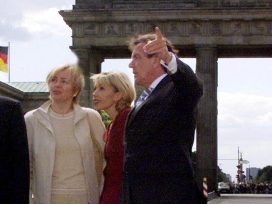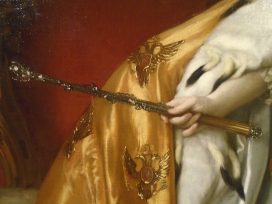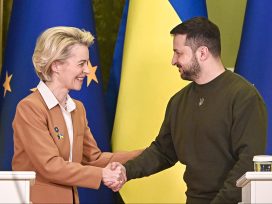The PUTIN show: Kirill Serebrennikov and Russia’s conservative revolution
Russian theatre director Kirill Serebrennikov, arrested in August 2017 for alleged fraud, is the victim of the cultural backlash following Putin’s re-election in 2012, writes Marina Davydova. His case is a lens through which to understand Russia’s problems.
The case opened in the early hours of 23 May 2017, when seventeen different premises were raided, including the Gogol Centre, a theatre established by Kirill Serebrennikov. Those who happened to be in the vicinity thought it was a bomb alert: the centre’s perimeter was cordoned off, masked men with guns ran about inside and outside the building, all the actors and stage hands were corralled onto the stage, had their phones taken away and they were not allowed to leave the building for several hours. At that point it was already clear that this was no ordinary case of embezzlement but rather an operation staged in order to put the frighteners on the entire theatre world. But why just then? Why was Kirill Serebrennikov cast in the role of principal victim? And why had the criminal case nothing to do with the Gogol Centre, as one might have expected, but instead concerned Platform, a project Serebrennikov was involved with from 2011 to 2014, before the centre was even established?
For all these questions there is a simple answer. For some time now, Aleksei Navalny, a leading opposition figure in present-day Russia, has led a crusade against the corruption that is rampant in the higher echelons of Russian power. The case against Serebrennikov was, among other things, a direct response to Navalny’s disclosures.
The Kremlin prefers mirror-like responses whenever possible. If people in Moscow flock to meetings against rigged parliamentary elections, a large number of ‘Putings’ (public meetings in support of Putin – ed.) are soon organised in support of the country’s highest authorities. If an opposition figure sets about exposing major financial misconduct in the highest echelons of power, similar revelations about members of the opposition or the liberal intelligentsia are sure to follow. Of course, these revelations must be accompanied by enormous publicity focused on a well-known public figure.
The theatre world is a particularly convenient target. On the one hand, it boasts a high concentration of famous names. On the other hand, Russian theatre is more dependent on state funding than any other art form. And third, the country’s financial legislation is designed in such an absurd fashion that it is virtually impossible to do anything in the theatre without breaking the law. A theatre director who always adheres scrupulously to the letter of the law would be unable to pay for toilet paper, let alone costumes. This makes theatre a very handy target for exposures: whenever it suits them, the powers-that-be can find instances of ‘embezzlement’ linked to someone who has fallen out of favour.
But this is just the tip of the iceberg. What lies below the surface is far more interesting. In hindsight we can now see that in 2011, when the Platform project was launched, we were living in an entirely different era. Crimea had yet to be annexed; not only were contacts with the West not forbidden, they were positively encouraged; the legal amendment relating to offending religious feelings had not yet been adopted; and people on the contemporary art scene were not yet regarded as traitors to the nation. Moreover, it was during Dmitry Medvedev’s presidency (whether real or only nominal depends on your point of view) that – for the first time in the history of the Russian Federation – the regime had, in effect, publicly declared that it was willing and able to support what was understood to be contemporary art.
The four years under Medvedev (2008 to 2012) are often dismissed in Russia, and even more in the West, where it was taken as a given that Medvedev was just Putin’s regent on the throne. As a matter of fact the issue is not how much power Medvedev enjoyed. What is important is that it was during his presidency that several areas of society – such as industry, the economy, science and others – were obliged to modernize and westernize.
During the Medvedev years great strides were taken towards liberalizing the legislation regulating business. Two years of military service were replaced by one. A system of uniform state exams was introduced in universities, raising standards in Russian education closer to those in the West. Interestingly, it was in these years that the Russian law enforcement force changed its name from ‘militsya’ to ‘politsya’. ‘Police’ implies something ‘Western’ while ‘militsya’ conjures up something more Soviet.
In the second year of Medvedev’s presidency, as part of the process of modernization and westernization, the Kremlin establishment suddenly remembered the arts. By then it had become clear that it would be extremely difficult to introduce substantive reforms in the economy, while cosmetic changes (such as changing the name of the police) did not go far enough. Cultural reforms became a kind of substitute for a genuine modernization that failed to take place elsewhere.
The stenographic record of a meeting Medvedev held with a range of cultural figures on 24 March 2011 provides unambiguous evidence that, at that point, the Kremlin was not merely reaching out to new trends and modernizing efforts in the arts but was, to a degree, instrumental in prompting them. This direct quote from the president is a case in point: ‘In my view, the modernization that I and other colleagues have been talking about a lot recently, the modernization of our life, of the foundations of our economy and political system, has to be carried out by people who embrace development. And these are typically people who appreciate and understand contemporary art. I mean, there is a direct link, if you will…’ [author’s italics.]
However, one of the constituent parts of culture – theatre – happens to be rather complex. Modernizing it was a particularly daunting task. In Russia, theatre has proved to be most resistant to the winds of change. While literally everything else was able to move onto new tracks (whether these tracks were good or bad is another issue), the unwieldy, inflexible repertory theatre companies and equally inflexible and conservative drama academies had barely changed since 1975, and maybe not even since Stalin’s time. The authorities were suddenly in need of people they could involve in their modest modernizing efforts (of a primarily organizational, but also partly aesthetic, kind).
Kirill Serebrennikov turned out to be one of those people who, it bears repeating, are thin on the ground in Russian theatre.
It is commonly believed that the celebrated director took to going to the Kremlin hat in hand, begging for money for his various projects. But this is pure myth. In fact, the exact opposite happened. As part of their modernization drive, the authorities, in the persons of specific bureaucrats, started looking around and asking: who might be our best bet in the theatre? Who is a symbolic figure? And the person they came up with was Serebrennikov.
He had always been a one-off in Russia’s theatre world. Unlike the vast majority of Russian directors, he did not graduate from an academy of drama (a diploma in directing from one of these is a kind of fetish in Russia; a director without one can never shake off the label of being a dilettante). He was the first to bring the ‘new drama’ (from the Presnyakov brothers to Mark Ravenhill) up from the underground and onto the most revered Russian stages, such as MKhT, the Moscow Art Theatre. He had never shied away from openly tackling social issues, something that is scorned by traditional Russian theatre, where art is supposed to deal with the eternal, not the ephemeral. He has, in effect, broken all the unwritten laws of Russian theatre, but was nevertheless adored by the nation’s greatest actors, becoming one of the best-known Russian directors.
This fact aroused impassioned envy and irritation among many theatre professionals who believed that the fame acquired by ‘this amateur without a diploma’ was built solely on ‘destroying the traditions of Russian theatre’. However, all the qualities that the rather conservative theatre community in Russia regarded as dangerous and harmful were in the Medvedev years suddenly sought after by the political establishment. So, ironically, at a certain point the officials proved more progressive than the theatre community.
It was in this context that, in 2011, Serebrennikov launched his Platform, a project that drew together four different strands: contemporary dance, contemporary music, contemporary theatre and multimedia. It is impossible to list all the choreographers, composers, designers, musicians, actors and performers who have participated in the Platform’s wide-ranging activities. It is equally difficult to estimate the number of actual events that were organised: when the participants tried to recreate a factual account of those years, they collected over eighty posters! It must also be stressed that in those years most Russian theatres would not have touched many of the artists, composers and directors brought in by Serebrennikov with a barge-pole. This in fact amounted to an attempt to set up a parallel cultural life based on new ideas and European models of development.
In 2012 Sergei Kapkov, the progressive head of the Department for Culture in Moscow at the time, appointed Serebrennikov as artistic director of the dull Gogol Theatre, a place no theatre critic had set foot in for many years. The acclaimed director eventually transformed it into the Gogol Centre, a stronghold of avant-garde theatre experimentation. In effect, he established a new type of theatre in Moscow, one whose doors were open to the public virtually round the clock and which – apart from theatre shows and premieres – hosted a constant stream of round tables, political discussions, lectures and film screenings attracting liberal- and opposition-minded people. All this happened during the Medvedev era.
It is telling that the creation of this new institution gave rise to a wave of protests and scandals especially among the theatre community: actors who belonged to the old Gogol Theatre company were adamantly against any modernization, and they went out into the streets of Moscow under patriotic banners, calling on the authorities to put a stop to ‘the destruction of the values of the national theatre’. They took to penning reports to all sorts of authorities, from the State Duma to the prosecutors’ office, denouncing the productions under the newly appointed artistic director and charging them with every possible sin: using foul language, offending the feelings of religious believers, promoting homosexuality and paedophilia, as well as misappropriating state funds.
These denunciations show clearly that what western journalism often presents as a conflict between Russian society and Russian authorities does not adequately reflect the situation. Advocates of modernization as well as proponents of the status quo, people holding liberal as well as pro-government views, can be found in all walks of Russian life, from the top of the pyramid of power to the theatre community itself. Suffice it to say that the main theatre in Rostov-on-Don, the city where Serebrennikov was born and grew up, is still showing ‘Stalin: Watchmaker’, a play that presents Stalin as an effective manager, directed by Aleksandr Pudin in the best socialist tradition. It would be naive to assume that Pudin was forced to stage the play by someone high up. He did it listening to his own heart. Russia is full of people like Pudin. And every one of them is willing to denounce an ‘improper’ director whenever required.
However, whereas during the presidency of Dmitry Medvedev conservative theatre makers’ tales of the dreadful destroyer of Russian morality and the Russian theatre tradition were of interest only to themselves and those close to them, in the years that followed the atmosphere in the country began to change radically.
In 2012 Vladimir Putin was elected to a third term of office as president. To be more precise, he again ascended the throne he had temporarily vacated for Medvedev, graciously offering his former successor the position of prime minister. In his election campaign Putin emphasized conservative values instead of modernization. He made the correct calculation that in dire economic times (the oil price had already started to fall) the only way to retain power was by drawing on the most archaic needs emanating from the very depths of the national psyche, namely the imperial idea which, paradoxically, unites Russian Orthodox traditions with the glorification of the Soviet past.
The eighteen years of the Putin era in fact comprise several individual eras. Imagine you have come to the theatre. The curtain is down, emblazoned with the name PUTIN. However, you don’t know what kind of show you will see when the curtain rises. This is the history of ‘Putinism’ in a nutshell. The supreme ruler does not really espouse any particular ideology. He is guided by expediency and the desire to retain power. In 2012 he found it useful to promote the idea of a resurgent great Russia, one that cherishes its traditions and opposes the decaying and amoral West, intent on enslaving it. However, if your choice of ideology is guided by expediency, you inevitably have to rely on people for whom this ideology constitutes a raison d’être.
Thus, the position of minister of culture in Putin’s 2012 cabinet fell to Vladimir Medinsky, a die-hard anti-westernizer and staunch patriot with close links to the most obscurantist circles of the Russian Orthodox Church and the FSB. In documents generated by the Ministry of Culture during the Medvedev era, every third word was ‘innovation’. After 2012 these documents were rewritten, painstakingly substituting ‘tradition’ for ‘innovation’.
Interestingly enough, relations between the new minister and Prime Minister Medvedev have been almost openly adversarial right from the start. Medinsky does not take his immediate boss seriously, correctly assuming that the patronage of high-ranking security officials has made his own position almost untouchable.
Medinsky’s ministry was one of the centres spearheading the conservative revolution in Russia. The ministry was behind the introduction of the currently prevalent idea of financial censorship, which is proving far more insidious than Soviet-style ideological censorship. What risk did a director run by staging a non-conformist play in the Soviet era? He ran the risk that the Culture Directorate (as the institution in charge was then called) might ban the production or impose changes on it. Nowadays the stakes are much higher. Formally there is no censorship, but in actual fact what happens is this: if you produce something that displeases the informal censors, any violation of the absurd financial regulations (and, as I have said, it is virtually impossible to function without breaking them) will be used against you. A director who chooses to stage a radical theatre show today thus puts at risk not only the production itself, but also the freedom of the theatre manager who signs all the financial documents. On occasion, as we are seeing now, he or she may also be risking their own freedom. The degree of self-censorship exercised by Russian theatre directors has made actual censorship redundant.
There are serious grounds to believe that it was Medinsky and his allies in the Russian Orthodox Church and the FSB who instigated the ‘Serebrennikov case’. As such, this is not only a war waged by a new generation of officials against a free theatre community. The battle is also being waged against the officials who implemented the modernization policy under Medvedev, in a kind of indirect conversation with them. For now we have taken aim at your protégé, but sooner or later we will get to those of you who dared turn great and independent Russia into a part of the decadent West. Vladimir Putin let the genie of conservatism out of the bottle, but the genie acquired a life of its own. It remains to be seen who will be dominated by it now.
Everything I am describing here can be neatly summed up by the word ‘backlash’. It is a reaction to the modernizing trend of the previous period, to society’s leap forward. Or, rather, the attempt at a leap. In Russia such leaps have always been short-lived.
It is worth recalling the gulf that opened between the Russian avant-garde of the 1920s and the ponderous Stalinist imperial style that replaced it by the end of that decade. Of course, Stalin’s policies were primarily driven by his autocratic aspirations, which led to the ruthless elimination of all potential rivals and their associates. But something else, apart from personal ambition, was at play: Stalin wagered that a majority of people harked back to the olden days and preferred the anti-western idea of building a new (Soviet) empire with a new tsar father-figure to all the revolutionary endeavours of the preceding period. Describing how one 1920s modernizing project after another was being reversed (from the sexual revolution to breakthroughs in pedagogical approaches) would take a long time. And it would take a long time to list all the avant-garde trends in theatre, literature and visual arts that were destroyed under Stalin’s rule. It did not happen from one day to the next, but one step at a time.
Nevertheless, by the end of the Stalin era, that is by the early 1950s, gone was Vsevolod Meyerhold’s Theatre, Alexander Tairov’s Chamber Theatre, Solomon Mikhoels’s Jewish Theatre, as well as the OBERIU collective responsible for the remarkable flowering of Russian absurdism. Nothing even vaguely resembling the 1920s remained. In effect, under Stalin the revolutionary project that had previously been pursued in the country by various means was replaced by a restoration project, although leftwing slogans continued to adorn the façade of the Soviet Union.
Of course, the brief upsurge of modernization that occurred under Medvedev cannot be compared with the extraordinary era of the Russian avant-garde, just as, fortunately, the present-day conservative turn is not as bloody as the one seventy years ago. But that does not change the substance. And inevitably, just as in the late 1920s, art is the main target of the new conservative revolution. In a country where since Stalin’s time a predilection for avant-garde experimentation and the emulation of western trends has been likened to high treason, and where the classics have been turned into icons to be venerated according to rigid rules, political issues always have required aesthetic validation.
The logic of the new conservatives is straightforward: if modernization has been pursued by people who ‘appreciate and understand contemporary art’, all its practitioners are automatically suspect. Having become an emblem of the modernizing trend, Kirill Serebrennikov obviously had to become the sacrificial lamb of the new conservative revolution. His case is just the most visible part of the battle between forces that we might, tentatively, refer to as archaic versus modernizing. The outcome of the battle is still uncertain. Very soon though, after the presidential election in March, we shall see what kind of performance will be staged when the curtain, still emblazoned with the name PUTIN, goes up.

Published 9 February 2018
Original in Russian
Translated by
Julia Sherwood
First published by Eurozine (English and Russian versions)
© Eurozine / Marina Davydova
PDF/PRINTIn collaboration with
In focal points
Newsletter
Subscribe to know what’s worth thinking about.
Related Articles
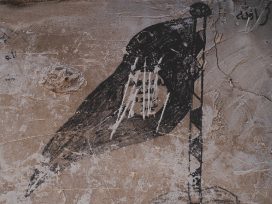
‘Practically every home in Pankisi bears the scars of the Second Chechen War, the Abkhazian War and the Syrian War. Practically every home has ties to the Islamic State.’ In this excerpt from her book ‘Goodbye, Isis: What Remains is Future’, Kateryna Sergatskova travels to the birthplace of Tarkhan Batirashvili, aka Omar al-Shishani, the former IS ‘Minister of War’.
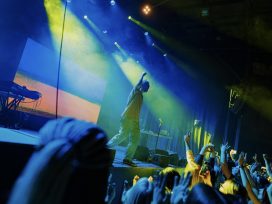
Growing numbers of Russians are fleeing the stifling atmosphere that has settled across the country’s political and cultural realms. Nowhere is this more tangible than in the world of popular music – once a shared cultural space between the two nations, now just another battleground in Russia’s war against Ukraine.




